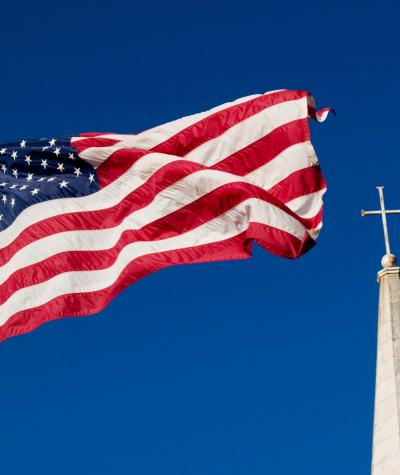President Donald Trump has promised to “totally destroy” the Johnson Amendment. If he did, he could be helping fill up the corrupt swamp that he promised to drain.
Although framed in terms of religious liberty, rolling back limitations on political activities by charities and churches could offer billionaire donors a way to not only influence elections anonymously, but also to get a charitable tax deduction for doing so.
The so-called “Johnson Amendment” refers to language that bars organizations incorporated under Section 501(c)(3) of the tax code – which includes churches, but also an array of charities – from endorsing candidates and participating in political campaign activities. The provision was introduced in 1954 by then-Senator Lyndon B. Johnson, passed by a Republican Congress, and signed by a Republican president.
The reason for the restriction is simple: 501(c)(3) organizations are subsidized by taxpayers for their charitable, religious and educational work, not partisan political activity.
Donors to charities and churches get a tax deduction for their contributions. And charities and churches are generally exempt from taxes. In exchange for these substantial tax benefits, these groups agree to abide by certain restrictions – like the prohibition on political intervention.
“Super Dark Money”
Trump wants to change that. And if he is successful in getting the Johnson Amendment repealed, it could lead to the creation of what might be called “super dark money groups.”
In the years since the Supreme Court’s Citizens United decision, nonprofits organized under a different section of the tax code, 501(c)(4), have spent millions on elections while keeping their donors secret. These 501(c)(4) political operations – known as “dark money” groups – offer donors anonymity, but not a tax deduction.
If the Johnson Amendment were repealed, and the ban on electoral politics were lifted for 501(c)(3) churches or charities, than donors to these “super dark money groups” would not only be offered anonymity, but also get a charitable tax deduction for bankrolling electoral activity.
This would further tilt the political system in favor of wealthy interests.
How Will Trump “Destroy” the Johnson Amendment?
It is not immediately clear how Trump would “destroy” the Johnson Amendment, or how broadly the “destruction” would reach.
Trump could issue an executive order directing the IRS, for example, to interpret the law narrowly to give churches the ability to endorse candidates. And he might direct the DOJ to apply its prosecutorial discretion to give a pass to churches and charities that engage in electoral activities. However, the law would still remain.
Congress, however, could also send a bill to Trump’s desk.
A bill introduced last session would amount to a wholesale repeal of the Johnson Amendment, allowing both charities and churches to operate as “super dark money” groups.
A more narrowly drafted bill (the “Free Speech Fairness Act” ) introduced the day before Trump’s prayer breakfast speech, is also problematic. The legislation would allow any charity (not just churches) to endorse or oppose candidates, as long as it occurs “in the ordinary course of the organization’s regular and customary activities in carrying out its exempt purpose” and “results in the organization incurring not more than de minimis incremental expenses.”
Although the proposal is narrower than it could be, the loopholes are easy to spot. For example, political operatives might incorporate a 501(c)(3), engage regularly in “public education” activities such as issue-focused TV advertising, and then as election day approaches, focus their ads more acutely on candidates.
Such a super dark money group might argue that TV ads are already part of their “regular and customary activities,” and that making its ads more candidate-focused doesn’t involve “more than de minimis incremental expenses”—and therefore using anonymous tax-exempt funds to influence elections is perfectly legal. (Such a group may have to report their spending on some communications to the FEC as electioneering communications or independent expenditures, however.)
Repeal Isn’t Necessary or Wise
Churches and charities play an important role in civil society. Under current law, churches have the liberty to criticize or support officeholders, to speak out on policy issues and, of course, to speak freely on matters of faith. Individual church leaders and congregants have the freedom to endorse or oppose candidates in their individual capacity.
And even those churches who do endorse candidates from the pulpit rarely face repercussions.
The biggest impact of repealing the Johnson Amendment would be to convert churches and charities into dark money organizations, and to force taxpayers to subsidize secret money in politics.
